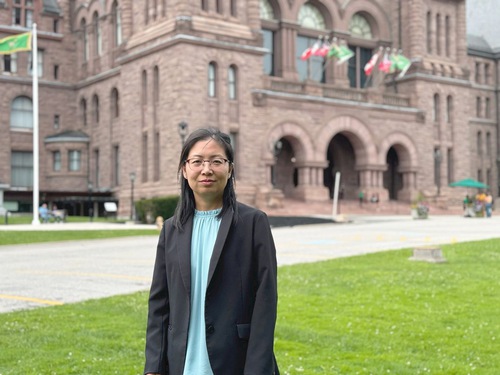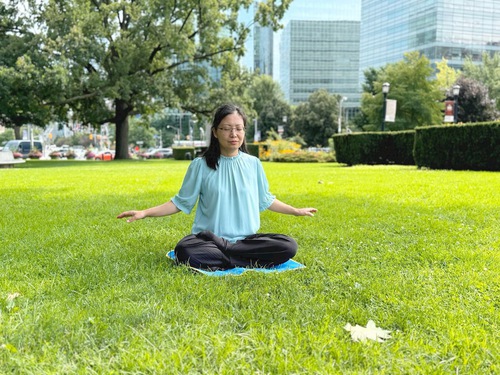Answering a Coworker’s Doubts About Shen Yun
(Minghui.org) Tan Junzi has worked as a data analyst in a government department in Ontario, Canada, for seven years. She is the leader of the technical skills team and is very diligent. She is kind to everyone and gets along well with her colleagues. Before Shen Yun performed in Toronto last year, she posted information about the show on an internal employee platform.
 Tan Junzi is a data analyst in a government department in Ontario.
Tan Junzi is a data analyst in a government department in Ontario.
A Coworker Negatively Comments on Shen Yun
Many colleagues thanked her for posting the information and liked her message. One colleague, however, published a negative comment below her post.
After she saw Shen Yun, that colleague wrote that she thought the costumes and dances were nice but she could not accept the content on Falun Gong and thought it was bizarre. She also quoted untrue information about Shen Yun she’d read on the internet to support her observation.
Junzi said, “At first, I didn’t know what to say. I didn’t want my coworkers who hadn’t seen Shen Yun to be affected by her comment and thought about deleting my message to avoid further misunderstandings. On the other hand, I thought I should face the situation in a positive manner.”
She decided to reply to the woman’s comment. She wrote: “I’m sorry your experience was as you described. Everyone I talked to praised Shen Yun’s message and beauty.”
Soon after, the colleague sent an email directly to Junzi: “When I saw the show last year, I heard comments about modernity and evolution being evil and saw a scene in which the solution to COVID was prayer. It made me feel very uncomfortable. When I looked up the organization afterwards and read a bit, I learned that their leader has come out against feminism, homosexuality, and aspects of science. This was clearly not a group that aligned with my values in some important ways. I know not everyone has the same experience nor did I intend this in anyway as a blanket statement about ancient traditions and cultures. It certainly is a beautiful show aesthetically, but I felt very intellectually and morally uncomfortable with it as a science professional and a queer ally.”
Resolving Her Colleague’s Doubts
After reading the email several times, Junzi realized what her colleague’s concerns and doubts were. She thus replied with a long email explaining the situation to her.
She wrote: “After researching the theory of evolution a bit, I realized it’s just an ongoing process of humanity exploring and discovering the truth of the universe, and this Darwinian theory is hypothesis, not a truth carved in stone. In contrast to the vast cosmos, human beings are minuscule. For thousand of years we’ve explored the world, forgoing ahead. We broke rules and ushered in new eras—then why should we limit ourselves to one possibility? As a scientist myself, I would like to embrace different views with an open mind.”
She also mentioned her observations on the benefits of traditional ideas on today’s society. “Much like Christians believe in God and indigenous people honor mother nature as the creator, traditional Chinese believe in reincarnation—that is, by being a better person and doing good things, you can be rewarded in your next life or get into a higher dimension of the universe after death. This encourages people to be better.”
In regard to the woman’s concern about praying to God as a solution to COVID, Junzi wrote: “China’s culture can be traced back 5,000 years, and its people hold reverence for the heavens and respect for the divine. They firmly believe both natural and man-made disasters serve as warnings from heaven to humanity. According to an ancient Chinese book of medicine, The Yellow Emperor’s Classic of Internal Medicine, ‘When righteousness resides within, evil cannot intrude.’ It basically means that the occurrence or aggravation of a disease is contingent on the presence of positive energy within an individual. If one’s body has abundant positive energy, the malevolent and harmful energy associated with illness will be unable to afflict the body, and vice versa. I believe what Shen Yun’s program was trying to convey is that, by practicing cultivation to assimilate their thoughts and actions to the universal principles of Truthfulness-Compassion-Forbearance, people can attune to the purer energies in the universe.”
 Junzi does the fifth Falun Gong exercise, the meditation.
Junzi does the fifth Falun Gong exercise, the meditation.
Explaining the misinformation on the internet about Shen Yun’s founder, Junzi wrote: “Numerous articles online feature statements or claims are allegedly made by Shen Yun’s director or Falun Gong’s founder, yet there is a noticeable absence of supporting evidence for any of them. These instances appear to be either fabrications or misinterpretations.
“Regarding sexual ethics, Falun Gong holds traditional views similar to the teachings of Buddhism or Christianity but does not attempt to impose these views on anyone. And in keeping with its values of compassion and tolerance, our belief is that every one of us is a spiritual being looking to ascend back to where we rightfully came from and that we should treat all people equally and with kindness, even if we might not agree with what they choose to do in their personal lives.
“Regarding feminism, the founder once stated in passing that feminism was created because men did not treat women correctly in the beginning! And that’s absolutely not anti-feminism from my point of view. I often think that the world today would truly be a better place if everyone treated each other with kindness and compassion.”
In her email, Junzi also mentioned that the CCP’s persecution includes Falun Gong practitioners, Uyghurs, and Tibetans. Shen Yun performances not only feature traditional Chinese culture, but also expose the regime’s persecution of Chinese citizens and hope more people can pay attention to this and help stop the brutalities.
Coworker Touched by Junzi’s Sincere Email
A few hours later, the woman sent a reply to Junzi’s email: “Thank you for your sensitive email and for taking the time to share so much information and context with me. I too am aware of, and am distressed by, the human rights abuses by the Chinese government. I hope that your friends and community stay safe and that in the future your rights and safety will be restored in your ancient homeland. I really didn’t mean to cause any harm or offense, and I’m grateful for your willingness to share your thoughts with me.”
Junzi replied to her coworker’s email expressing her hope that more people can see the positive message in Shen Yun and asked if she would delete her previous negative comment. She complied without hesitation.
How Junzi Began Practicing Falun Gong
Tan Junzi is from Shandong, China. She graduated from a prestigious university and worked as an engineer and a university lecturer. In the summer of 1997, she returned home from university for the summer holidays. Her mother told her about Falun Gong and suggested she practice it as well. Junzi’s mother had long term health issues. Despite going to many doctors and spending a lot of money on treatments, her health did not improve. Yet, after practicing Falun Gong, she recovered.
Junzi accompanied her mother to watch Master’s taped lectures. She was soon drawn by the teachings. She recalled, “In the past, I had thought of seeking the Way and often looked up into the sky, wondering why this universe was so vast, yet humanity was so small—where did humans come from and what did we live for? I understood at once after listening to Master’s lectures. Wow! All my questions were answered, as if an electric current passed through me.”
She took a copy of Zhuan Falun with her when she returned to university at the end of the holidays and began cultivating.
The persecution began when she was pursuing her postgraduate degree. Her mother was repeatedly arrested for refusing to give up her faith. Junzi was forced to leave China to avoid being persecuted herself.
She wants to share the benefits she’s gained through practicing Falun Gong and therefore helps promote Shen Yun. Her coworkers thanked her for introducing them to such a beautiful show after they saw the performances.